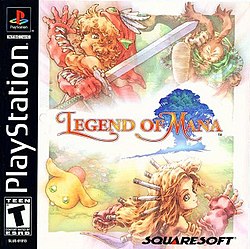Legend of Mana
| Legend of Mana | |
|---|---|

North American box art
|
|
| Developer(s) | Square |
| Publisher(s) | Square |
| Director(s) | Koichi Ishii |
| Producer(s) | Akitoshi Kawazu |
| Designer(s) | Akihiko Matsui |
| Programmer(s) | Tomoki Anazawa |
| Artist(s) |
|
| Writer(s) | Nobuyuki Inoue |
| Composer(s) | Yoko Shimomura |
| Series | Mana |
| Platform(s) | PlayStation |
| Release date(s) | |
| Genre(s) | Action role-playing game |
| Mode(s) | Single-player, multiplayer |
| Seiken Densetsu / Legend of Mana Original Soundtrack | |
|---|---|
| Soundtrack album by Yoko Shimomura | |
| Released | July 23, 1999 October 20, 2004 (reprint) |
| Genre | Video game soundtrack |
| Length | 2:10:37 |
| Label | DigiCube Square Enix (reprint) |
| Aggregate score | |
|---|---|
| Aggregator | Score |
| GameRankings | 73 / 100 (23 reviews) |
| Review scores | |
| Publication | Score |
| Famitsu | 31 / 40 |
| GamePro | 4 / 5 |
| GameSpot | 7 / 10 |
| IGN | 8.3 / 10 |
| RPGamer | 4 / 5 |
| Next Generation | 2 / 5 |
Legend of Mana, originally released in Japan as Seiken Densetsu: Legend of Mana, is a 1999 action role-playing game developed and published by Square (now Square Enix) for the PlayStation. It is the fourth game in the Mana series, following 1995's Seiken Densetsu 3. Set in a high fantasy universe, the game follows an unnamed hero as they restore the land of Fa'Diel by creating the world around them and completing a number of interrelated quests in order to restore the Tree of Mana.
While incorporating action role-playing elements from the prior games in the series, such as real-time battles, Legend of Mana has its own distinct style of gameplay. Most notably, it gives the player the ability to shape the world's structure through the Land Make system, generating regions and quests in a non-linear gameplay system rather than a strong main plotline. Legend of Mana was directed by series creator Koichi Ishii, designed by Akihiko Matsui, and produced by veteran Square director and producer Akitoshi Kawazu.
The game had high sales, selling 400,000 copies in its first week of release and 700,000 by the end of 1999. Reviews were less positive than for prior games in the series. Critics gave considerable acclaim to its vibrant and colorful hand-drawn graphics and soundtrack by Yoko Shimomura, but were critical of the lack of a clear main storyline, stating that it left the game feeling disjointed. The game was re-released as a part of both the PlayStation's and Square Enix's best-sellers lines, and re-released on the PlayStation 3 PlayStation Network store as part of the PSone Classics series in 2011.
...
Wikipedia
